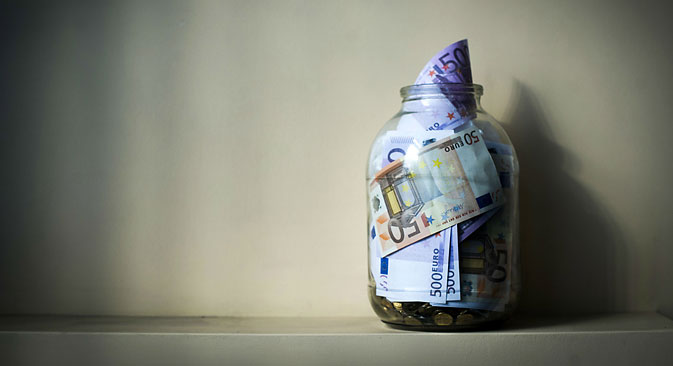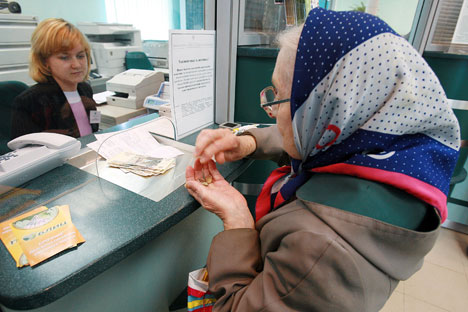Russians tightening purse strings as GDP decline gathers pace

Data from the Russian Statistics Service indicates that the population has responded to the reduction of real salaries by beginning to actively save money. Source: Sergei Bobylev / TASS
Newly-published information indicates that in March 2015 the volume of Russia's GDP decreased year-on-year by 3.4 percent, the Russian business newspaper RBK Daily has reported. The data from the Ministry of Economic Development, released in early May, shows that in comparison with February 2015 the pace of the economy's year-on-year shrinkage was almost three times less, at 1.2 percent.
"The acceleration of Russia's GDP fall in March is related to the high level of inflation pressure and expensive credit, which is having a negative effect on the dynamics of the country's economy," says Alexei Kozlov, chief analyst at UFS IC.
The forecast for inflation in 2015 is 11.9 percent, while the Central Bank's key rate, which private banks use as a reference point, was 12.5 percent at the beginning of May.
End of a cycle
According to the information from the Ministry of Economic Development, the fall of real salaries is also continuing to accelerate. After a 7.4-percent reduction in February they dropped by another 9.3 percent in March. Meanwhile, the volume of work in the construction sector fell by 6.7 percent in March, which is the worst result since July 2014, says the ministry’s monitoring report.
The ministry had earlier made slight improvements to its economic outlook for 2015, forecasting the economy to shrink by 2.8 percent instead of the previously predicted 3-percent fall in GDP.
Meanwhile, data from the Russian Statistics Service indicates that the population has responded to the reduction of real salaries by beginning to actively save money. According to the data, in the first quarter of 2015 Russians spent 78.1 percent of their earnings on buying goods and services, while during the same period in 2014 the percentage was 82.3. Meanwhile, the purchasing of securities has doubled in respect to the first quarter of 2014 – a clear indicator that Russians have begun taking saving more seriously.
Economists believe that the fall in GDP is also due to cyclical problems. "The recession in Russia as a whole resembles more the acceleration of the decline in the final phase of an economic cycle," says Anton Soroko, analyst at Finam Investment Holding.
In his view, the economy is suffering from a number of factors, including the stagnation of the real sector as a result of the fall of oil prices and a decline in investment activity related to the growth of credit costs. Additionally, the growth of geopolitical risks and instability on financial markets is also influencing companies' investment activity.
According to Soroko, it is still too early to say that the Russian economy has bottomed out: This may not occur until the second half of 2015.
Outlooks for the future
Russian analysts believe that the country’s economy will continue to contract in the near future. "The fall of GDP will continue, but not substantially," says Boris Pivovar, senior professor in the Faculty of Economic and Social Sciences at the Russian Presidential Academy of National Economy and Public Administration. "During the spring and summer retail usually falls, especially sales of home appliances and automobiles."
Pivovar points out that exports of oil and gas are also usually lower in the summer than in the winter months, and in the current political conditions a surge in sales and contracts is unlikely. "The negative trend will change in the fall-winter, when gas exports will pick up, especially to Ukraine, and the construction projects will have finished after the summer season," he says.
Consequently, Pivovar predicts a short-term inertial fall in the first, second and third quarters and a substantial growth in GDP by 0.5-1.5 percent in the fourth quarter of 2015, as the traditional winter boost in the retail sector revives commerce.
UFS IC analyst Alexei Kozlov, meanwhile, forecasts a slowdown in the pace of the growth of consumer prices as the ruble continues to stabilize, which will lower the cost of credit, letting steam out of the economy and stabilizing GDP dynamics.
All rights reserved by Rossiyskaya Gazeta.
Subscribe
to our newsletter!
Get the week's best stories straight to your inbox
